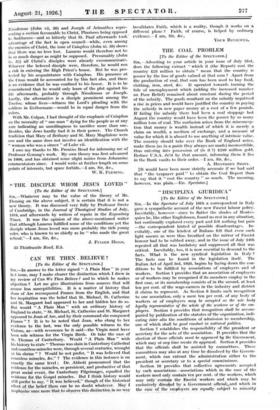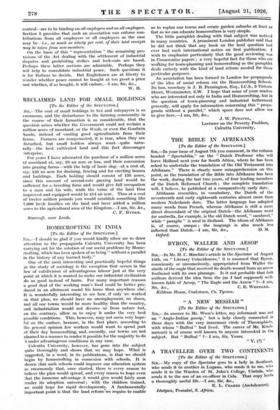" DISCIPLINA GIURIDICA "
[To the Editor of the SPECTATOR.] Sta—In the Spectator of July 10th a correspondent in Italy gave a sympathetic account of the new Fascist labour policy. Inevitably, however—since to flatter the shades of Montes- quieu he, like other Englishmen, found no rest in any situation, but continually explored every part and felt nothing but pain —the correspondent hinted of possible disadvantages. In- evitably, one of the kindest of Italians felt that even such light smears as were thus breathed on the mirror of Fascist honour had to be rubbed away, and in the issue of July 24th repeated all that was laudatory and suppressed all that was critical. Inevitably, too, it is now essential to descend to the facts. What is the new syndical legislation in Italy ? The facts can be found in the legislation itself. The Italian Act of April 3rd, 1926, begins by laying down the con- ditions to be fulfilled by associations of employers and of workers. Section 1 provides that an association of employers or of workers may be recognized if its members employ in the first case, or its membership consists of in the second, at least ten per cent. of the wage-earners in the industry and district it claims to represent. As Section 6 limits such recognition to one association, only a mere ten per cent, of' any body of workers or of employers may be accepted as the sole body legally representative of the whole of the workers or of the em- ployers. Section 4 provides that recognition shall be accom- panied by publication of the statutes of the organization, indi- cating inter alia the conditions of admission to membership, one of which shall be good conduct in national politics.
Section 7 establishes the responsibility of the president or secretary for the acts of the association. It provides that the election of these officials must be approved by the Government, which may at any time revoke its approval. Section 8 provides that the officials shall be assisted by committees. These committees may also at any time be dissolved by the Govern- ment, which can entrust the administration either to the president or secretary or to a special commissioner.
Section 10 provides that collective agreements accepted by such associations—associations which in the case of the workers need only contain ten per cent. of the workers, which may only contain the Fascist workers and which may be exclusively directed by a Government officiaLrand which in the ease of the employers are equally subject to minority
control—are to be binding on all employers and on all employees. Section 5 provides that such an association can enforce con- tributions from all employers or all employees as the case may be—i.e., as much as ninety per cent. of their total receipts may be taken from non-members. .
On the basis of this " representation " the remaining pro- visions of the Act dealing with the settlement of industrial disputes and prohibiting strikes and lock-outs are based. Perhaps these latter sections are admirable. Perhaps they. will help to consolidate industrial peace. Such questions it is for Italians to decide. But Englishmen are at liberty to wonder whether peace cannot be bought at too great a price and whether, if so bought, it will endure.—! am, Sir, &c., W. B.



































 Previous page
Previous page